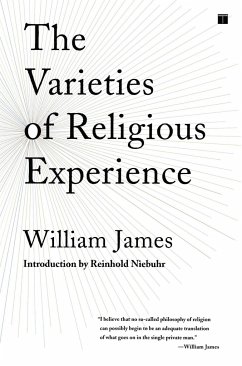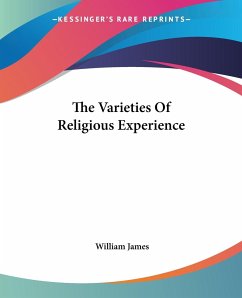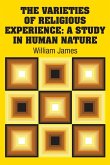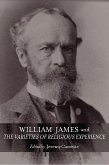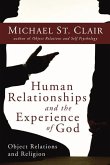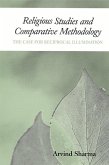17,99 €
inkl. MwSt.
Versandfertig in über 4 Wochen

9 °P sammeln
- Broschiertes Buch
- Merkliste
- Auf die Merkliste
- Bewerten Bewerten
- Teilen
- Produkt teilen
- Produkterinnerung
- Produkterinnerung
The culmination of William James' interest in the psychology of religion, "The Varieties of Religious Experience" approached the study of religious phenomena in a new way -- through pragmatism and experimental psychology. The most important effect of the publication of the Varieties was to shift the emphasis in this field of study from the dogmas and external forms of religion to the unique mental states associated with it. Explaining the book's intentions in a letter to a friend, James stated: "The problem I have set myself is a hard one: first, to defend...'experience' against 'philosophy'…mehr
Andere Kunden interessierten sich auch für
![The Varieties Of Religious Experience The Varieties Of Religious Experience]() William JamesThe Varieties Of Religious Experience30,99 €
William JamesThe Varieties Of Religious Experience30,99 €![The Varieties of Religious Experience The Varieties of Religious Experience]() William JamesThe Varieties of Religious Experience22,99 €
William JamesThe Varieties of Religious Experience22,99 €![The Varieties of Religious Experience The Varieties of Religious Experience]() William JamesThe Varieties of Religious Experience23,99 €
William JamesThe Varieties of Religious Experience23,99 €![The Varieties of Religious Experience The Varieties of Religious Experience]() William JamesThe Varieties of Religious Experience26,99 €
William JamesThe Varieties of Religious Experience26,99 €![William James and The Varieties of Religious Experience William James and The Varieties of Religious Experience]() William James and The Varieties of Religious Experience84,99 €
William James and The Varieties of Religious Experience84,99 €![Human Relationships and the Experience of God: Object Relations and Religion Human Relationships and the Experience of God: Object Relations and Religion]() Michael St ClairHuman Relationships and the Experience of God: Object Relations and Religion23,99 €
Michael St ClairHuman Relationships and the Experience of God: Object Relations and Religion23,99 €![Religious Studies and Comparative Methodology Religious Studies and Comparative Methodology]() Arvind SharmaReligious Studies and Comparative Methodology43,99 €
Arvind SharmaReligious Studies and Comparative Methodology43,99 €-
-
-
The culmination of William James' interest in the psychology of religion, "The Varieties of Religious Experience" approached the study of religious phenomena in a new way -- through pragmatism and experimental psychology. The most important effect of the publication of the Varieties was to shift the emphasis in this field of study from the dogmas and external forms of religion to the unique mental states associated with it. Explaining the book's intentions in a letter to a friend, James stated: "The problem I have set myself is a hard one: first, to defend...'experience' against 'philosophy' as being the real backbone of the world's religious life...and second, to make the hearer or reader believe what I myself invincibly do believe, that, although all the special manifestations of religion may have been absurd (I mean its creeds and theories), yet the life of it as a whole is mankind's most important function." Drawing evidence from his own experience and from such diverse thinkers as Voltaire, Whitman, Emerson, Luther, Tolstoy, John Bunyan, and Jonathan Edwards, "The Varieties of Religious Experience" remains one of the most influential books ever written on the psychology of religion.
Hinweis: Dieser Artikel kann nur an eine deutsche Lieferadresse ausgeliefert werden.
Hinweis: Dieser Artikel kann nur an eine deutsche Lieferadresse ausgeliefert werden.
Produktdetails
- Produktdetails
- Verlag: Atria Books
- Seitenzahl: 398
- Erscheinungstermin: 1. Mai 2004
- Englisch
- Abmessung: 212mm x 142mm x 30mm
- Gewicht: 376g
- ISBN-13: 9780743257879
- ISBN-10: 0743257871
- Artikelnr.: 22427533
- Herstellerkennzeichnung
- Libri GmbH
- Europaallee 1
- 36244 Bad Hersfeld
- gpsr@libri.de
- Verlag: Atria Books
- Seitenzahl: 398
- Erscheinungstermin: 1. Mai 2004
- Englisch
- Abmessung: 212mm x 142mm x 30mm
- Gewicht: 376g
- ISBN-13: 9780743257879
- ISBN-10: 0743257871
- Artikelnr.: 22427533
- Herstellerkennzeichnung
- Libri GmbH
- Europaallee 1
- 36244 Bad Hersfeld
- gpsr@libri.de
William James was the first educator in the United States to offer a psychology course. An American philosopher, historian, and psychologist, James is widely known for The Principles of Psychology (1890) as well as many essays on the science of religion.
Contents Introduction Author's Preface 1 Religion and Neurology Introduction: the course is not anthropological, but deals with personal documents
Questions of fact and questions of value
In point of fact, the religious are often neurotic
Criticism of medical materialism, which condemns religion on that account
Theory that religion has a sexual origin refuted
All states of mind are neurally conditioned
Their significance must be tested not by their origin but by the value of their fruits
Three criteria of value; origin useless as a criterion
Advantages of the psychopathic temperament when a superior intellect goes with it
especially for the religious life. 2 Circumscription of the Topic Futility of simple definitions of religion
No one specific "religious sentiment"
Institutional and personal religion
We confine ourselves to the personal branch
Definition of religion for the purpose of these lectures
Meaning of the term "divine"
The divine is what prompts solemn reactions
Impossible to make our definitions sharp
We must study the more extreme cases
Two ways of accepting the universe
Religion is more enthusiastic than philosophy
Its characteristic is enthusiasm in solemn emotion
Its ability to overcome unhappiness
Need of such a faculty from the biological point of view. 3 The Reality of the Unseen Percepts versus abstract concepts
Influence of the latter on belief
Kant's theological Ideas
We have a sense of reality other than that given by the special senses
Examples of "sense of presence"
The feeling of unreality
Sense of a divine presence: examples
Mystical experiences: examples
Other cases of sense of God's presence
Convincingness of unreasoned experience
Inferiority of rationalism in establishing belief
Either enthusiasm or solemnity may preponderate in the religious attitude of individuals. 4 and 5 The Religion of Healthy
Mindedness Happiness is man's chief concern
"Once
born" and "twice
born" characters
Walt Whitman
Mixed nature of Greek feeling
Systematic healthy
mindedness
Its reasonableness
Liberal Christianity shows it
Optimism as encouraged by Popular Science
The "Mind
cure" movement
Its creed
Cases
Its doctrine of evil
Its analogy to Lutheran theology
Salvation by relaxation
Its methods: suggestion
meditation
"recollection"
verification
Diversity of possible schemes of adaptation to the universe
Appendix: Two mind
cure cases. 6 and 7 The Sick Soul Healthy
mindedness and repentance
Essential pluralism of the healthy
minded philosophy
Morbid
mindedness: its two degrees
The pain
threshold varies in individuals
Insecurity of natural goods
Failure, or vain success of every life
Pessimism of all pure naturalism
Hopelessness of Greek and Roman view
Pathological unhappiness
"Anhedonia"
Querulous melancholy
Vital zest is a pure gift
Loss of it makes physical world look different
Tolstoy
Bunyan
Alline
Morbid fear
Such cases need a supernatural religion for relief
Antagonism of healthy
mindedness and morbidness
The problem of evil cannot be escaped. 8 The Divided Self, and the Process of Its Unification Heterogeneous personality
Character gradually attains unity
Examples of divided self
The unity attained need not be religious
"Counter conversion" cases
Other cases
Gradual and sudden unification
Tolstoy's recovery
Bunyan's. 9 Conversion Case of Stephen Bradley
The psychology of character
changes
Emotional excitements make new centres of personal energy
Schematic ways of representing this
Starbuck likens conversion to normal moral ripening
Leuba's ideas
Seemingly unconvertible persons
Two types of conversion
Subconscious incubation of motives
Self
surrender
Its importance in religious history
Cases. 10 Conversion
Concluded Cases of sudden conversion
Is suddenness essential?
No, it depends on psychological idiosyncrasy
Proved existence of transmarginal, or subliminal, consciousness
"Automatisms"
Instantaneous conversions seem due to the possession of an active subconscious self by the subject
The value of conversion depends not on the process, but on the fruits
These are not superior in sudden conversion
Professor Coe's views
Sanctification as a result
Our psychological account does not exclude direct presence of the Deity
Sense of higher control
Relations of the emotional "faith
state" to intellectual beliefs
Leuba quoted
Characteristics of the faith
state: sense of truth; the world appears new
Sensory and motor automatisms
Permanency of conversions. 11, 12, and 13 Saintliness Sainte
Beuve on the State of Grace
Types of character as due to the balance of impulses and inhibitions
Sovereign excitements
Irascibility
Effects of higher excitement in general
The saintly life is ruled by spiritual excitement
This may annul sensual impulses permanently
Probable subconscious influences involved
Mechanical scheme for representing permanent alteration in character
Characteristics of saintliness
Sense of reality of a higher power
Peace of mind, charity
Equanimity, fortitude, etc.
Connection of this with relaxation
Purity of life
Asceticism
Obedience
Poverty
The sentiments of democracy and of humanity
General effects of higher excitements. 14 and 15 The Value of Saintliness It must be tested by the human value of its fruits
The reality of the God must, however, also be judged
"Unfit" religions get eliminated by "experience"
Empiricism is not skepticism
Individual and tribal religion
Loneliness of religious originators
Corruption follows success
Extravagances
Excessive devoutness, as fanaticism
As theopathic absorption
Excessive purity
Excessive charity
The perfect man is adapted only to the perfect environment
Saints are leavens
Excesses of asceticism
Asceticism symbolically stands for the heroic life
Militarism and voluntary poverty as possible equivalents
Pros and cons of the saintly character
Saints versus "strong" men
Their social function must be considered
Abstractly the saint is the highest type, but in the present environment it may fail, so we make ourselves saints at our peril
The question of theological truth. 16 and 17 Mysticism Mysticism defined
Four marks of mystic states
They form a distinct region of consciousness
Examples of their lower grades
Mysticism and alcohol
"The anæsthetic revelation"
Religious mysticism
Aspects of Nature
Consciousness of God
"Cosmic consciousness"
Yoga
Buddhistic mysticism
Sufism
Christian mystics
Their sense of revelation
Tonic effects of mystic states
They describe by negatives
Sense of union with the Absolute
Mysticism and music
Three conclusions
(1) Mystical states carry authority for him who has them
(2) But for no one else
(3) Nevertheless, they break down the exclusive authority of rationalistic states
They strengthen monistic and optimistic hypotheses. 18 Philosophy Primacy of feeling in religion, philosophy being a secondary function
Intellectualism professes to escape subjective standards in her theological constructions
"Dogmatic theology"
Criticism of its account of God's attributes
"Pragmatism" as a test of the value of conceptions
God's metaphysical attributes have no practical significance
His moral attributes are proved by bad arguments; collapse of systematic theology
Does transcendental idealism fare better? Its principles
Quotations from John Caird
They are good as restatements of religious experience, but uncoercive as reasoned proof
What philosophy can do for religion by transforming herself into "science of religions." 19 Other Characteristics Aesthetic elements in religion
Contrast of Catholicism and Protestantism
Sacrifice and Confession
Prayer
Religion holds that spiritual work is really effected in prayer
Three degrees of opinion as to what is effected
First degree
Second degree
Third degree
Automatisms, their frequency among religious leaders
Jewish cases
Mohammed
Joseph Smith
Religion and the subconscious region in general. 20 Conclusions Summary of religious characteristics
Men's religions need not be identical
"The science of religions" can only suggest, not proclaim, a religious creed
Is religion a "survival" of primitive thought?
Modern science rules out the concept of personality
Anthropomorphism and belief in the personal characterized pre
scientific thought
Personal forces are real, in spite of this
Scientific objects are abstractions, only individualized experiences are concrete
Religion holds by the concrete
Primarily religion is a biological reaction
Its simplest terms are an uneasiness and a deliverance; description of the deliverance
Question of the reality of the higher power
The author's hypotheses: 1. The subconscious self as intermediating between nature and the higher region
2. The higher region, or "God"
3. He produces real effects in nature. Postscript Philosophic position of the present work defined as piece
meal supernaturalism
Criticism of universalistic supernaturalism
Different principles must occasion differences in fact
What differences in fact can God's existence occasion?
The question of immortality
Question of God's uniqueness and infinity: religious experience does not settle this question in the affirmative
The pluralistic hypothesis is more conformed to common sense. Index
Questions of fact and questions of value
In point of fact, the religious are often neurotic
Criticism of medical materialism, which condemns religion on that account
Theory that religion has a sexual origin refuted
All states of mind are neurally conditioned
Their significance must be tested not by their origin but by the value of their fruits
Three criteria of value; origin useless as a criterion
Advantages of the psychopathic temperament when a superior intellect goes with it
especially for the religious life. 2 Circumscription of the Topic Futility of simple definitions of religion
No one specific "religious sentiment"
Institutional and personal religion
We confine ourselves to the personal branch
Definition of religion for the purpose of these lectures
Meaning of the term "divine"
The divine is what prompts solemn reactions
Impossible to make our definitions sharp
We must study the more extreme cases
Two ways of accepting the universe
Religion is more enthusiastic than philosophy
Its characteristic is enthusiasm in solemn emotion
Its ability to overcome unhappiness
Need of such a faculty from the biological point of view. 3 The Reality of the Unseen Percepts versus abstract concepts
Influence of the latter on belief
Kant's theological Ideas
We have a sense of reality other than that given by the special senses
Examples of "sense of presence"
The feeling of unreality
Sense of a divine presence: examples
Mystical experiences: examples
Other cases of sense of God's presence
Convincingness of unreasoned experience
Inferiority of rationalism in establishing belief
Either enthusiasm or solemnity may preponderate in the religious attitude of individuals. 4 and 5 The Religion of Healthy
Mindedness Happiness is man's chief concern
"Once
born" and "twice
born" characters
Walt Whitman
Mixed nature of Greek feeling
Systematic healthy
mindedness
Its reasonableness
Liberal Christianity shows it
Optimism as encouraged by Popular Science
The "Mind
cure" movement
Its creed
Cases
Its doctrine of evil
Its analogy to Lutheran theology
Salvation by relaxation
Its methods: suggestion
meditation
"recollection"
verification
Diversity of possible schemes of adaptation to the universe
Appendix: Two mind
cure cases. 6 and 7 The Sick Soul Healthy
mindedness and repentance
Essential pluralism of the healthy
minded philosophy
Morbid
mindedness: its two degrees
The pain
threshold varies in individuals
Insecurity of natural goods
Failure, or vain success of every life
Pessimism of all pure naturalism
Hopelessness of Greek and Roman view
Pathological unhappiness
"Anhedonia"
Querulous melancholy
Vital zest is a pure gift
Loss of it makes physical world look different
Tolstoy
Bunyan
Alline
Morbid fear
Such cases need a supernatural religion for relief
Antagonism of healthy
mindedness and morbidness
The problem of evil cannot be escaped. 8 The Divided Self, and the Process of Its Unification Heterogeneous personality
Character gradually attains unity
Examples of divided self
The unity attained need not be religious
"Counter conversion" cases
Other cases
Gradual and sudden unification
Tolstoy's recovery
Bunyan's. 9 Conversion Case of Stephen Bradley
The psychology of character
changes
Emotional excitements make new centres of personal energy
Schematic ways of representing this
Starbuck likens conversion to normal moral ripening
Leuba's ideas
Seemingly unconvertible persons
Two types of conversion
Subconscious incubation of motives
Self
surrender
Its importance in religious history
Cases. 10 Conversion
Concluded Cases of sudden conversion
Is suddenness essential?
No, it depends on psychological idiosyncrasy
Proved existence of transmarginal, or subliminal, consciousness
"Automatisms"
Instantaneous conversions seem due to the possession of an active subconscious self by the subject
The value of conversion depends not on the process, but on the fruits
These are not superior in sudden conversion
Professor Coe's views
Sanctification as a result
Our psychological account does not exclude direct presence of the Deity
Sense of higher control
Relations of the emotional "faith
state" to intellectual beliefs
Leuba quoted
Characteristics of the faith
state: sense of truth; the world appears new
Sensory and motor automatisms
Permanency of conversions. 11, 12, and 13 Saintliness Sainte
Beuve on the State of Grace
Types of character as due to the balance of impulses and inhibitions
Sovereign excitements
Irascibility
Effects of higher excitement in general
The saintly life is ruled by spiritual excitement
This may annul sensual impulses permanently
Probable subconscious influences involved
Mechanical scheme for representing permanent alteration in character
Characteristics of saintliness
Sense of reality of a higher power
Peace of mind, charity
Equanimity, fortitude, etc.
Connection of this with relaxation
Purity of life
Asceticism
Obedience
Poverty
The sentiments of democracy and of humanity
General effects of higher excitements. 14 and 15 The Value of Saintliness It must be tested by the human value of its fruits
The reality of the God must, however, also be judged
"Unfit" religions get eliminated by "experience"
Empiricism is not skepticism
Individual and tribal religion
Loneliness of religious originators
Corruption follows success
Extravagances
Excessive devoutness, as fanaticism
As theopathic absorption
Excessive purity
Excessive charity
The perfect man is adapted only to the perfect environment
Saints are leavens
Excesses of asceticism
Asceticism symbolically stands for the heroic life
Militarism and voluntary poverty as possible equivalents
Pros and cons of the saintly character
Saints versus "strong" men
Their social function must be considered
Abstractly the saint is the highest type, but in the present environment it may fail, so we make ourselves saints at our peril
The question of theological truth. 16 and 17 Mysticism Mysticism defined
Four marks of mystic states
They form a distinct region of consciousness
Examples of their lower grades
Mysticism and alcohol
"The anæsthetic revelation"
Religious mysticism
Aspects of Nature
Consciousness of God
"Cosmic consciousness"
Yoga
Buddhistic mysticism
Sufism
Christian mystics
Their sense of revelation
Tonic effects of mystic states
They describe by negatives
Sense of union with the Absolute
Mysticism and music
Three conclusions
(1) Mystical states carry authority for him who has them
(2) But for no one else
(3) Nevertheless, they break down the exclusive authority of rationalistic states
They strengthen monistic and optimistic hypotheses. 18 Philosophy Primacy of feeling in religion, philosophy being a secondary function
Intellectualism professes to escape subjective standards in her theological constructions
"Dogmatic theology"
Criticism of its account of God's attributes
"Pragmatism" as a test of the value of conceptions
God's metaphysical attributes have no practical significance
His moral attributes are proved by bad arguments; collapse of systematic theology
Does transcendental idealism fare better? Its principles
Quotations from John Caird
They are good as restatements of religious experience, but uncoercive as reasoned proof
What philosophy can do for religion by transforming herself into "science of religions." 19 Other Characteristics Aesthetic elements in religion
Contrast of Catholicism and Protestantism
Sacrifice and Confession
Prayer
Religion holds that spiritual work is really effected in prayer
Three degrees of opinion as to what is effected
First degree
Second degree
Third degree
Automatisms, their frequency among religious leaders
Jewish cases
Mohammed
Joseph Smith
Religion and the subconscious region in general. 20 Conclusions Summary of religious characteristics
Men's religions need not be identical
"The science of religions" can only suggest, not proclaim, a religious creed
Is religion a "survival" of primitive thought?
Modern science rules out the concept of personality
Anthropomorphism and belief in the personal characterized pre
scientific thought
Personal forces are real, in spite of this
Scientific objects are abstractions, only individualized experiences are concrete
Religion holds by the concrete
Primarily religion is a biological reaction
Its simplest terms are an uneasiness and a deliverance; description of the deliverance
Question of the reality of the higher power
The author's hypotheses: 1. The subconscious self as intermediating between nature and the higher region
2. The higher region, or "God"
3. He produces real effects in nature. Postscript Philosophic position of the present work defined as piece
meal supernaturalism
Criticism of universalistic supernaturalism
Different principles must occasion differences in fact
What differences in fact can God's existence occasion?
The question of immortality
Question of God's uniqueness and infinity: religious experience does not settle this question in the affirmative
The pluralistic hypothesis is more conformed to common sense. Index
Contents Introduction Author's Preface 1 Religion and Neurology Introduction: the course is not anthropological, but deals with personal documents
Questions of fact and questions of value
In point of fact, the religious are often neurotic
Criticism of medical materialism, which condemns religion on that account
Theory that religion has a sexual origin refuted
All states of mind are neurally conditioned
Their significance must be tested not by their origin but by the value of their fruits
Three criteria of value; origin useless as a criterion
Advantages of the psychopathic temperament when a superior intellect goes with it
especially for the religious life. 2 Circumscription of the Topic Futility of simple definitions of religion
No one specific "religious sentiment"
Institutional and personal religion
We confine ourselves to the personal branch
Definition of religion for the purpose of these lectures
Meaning of the term "divine"
The divine is what prompts solemn reactions
Impossible to make our definitions sharp
We must study the more extreme cases
Two ways of accepting the universe
Religion is more enthusiastic than philosophy
Its characteristic is enthusiasm in solemn emotion
Its ability to overcome unhappiness
Need of such a faculty from the biological point of view. 3 The Reality of the Unseen Percepts versus abstract concepts
Influence of the latter on belief
Kant's theological Ideas
We have a sense of reality other than that given by the special senses
Examples of "sense of presence"
The feeling of unreality
Sense of a divine presence: examples
Mystical experiences: examples
Other cases of sense of God's presence
Convincingness of unreasoned experience
Inferiority of rationalism in establishing belief
Either enthusiasm or solemnity may preponderate in the religious attitude of individuals. 4 and 5 The Religion of Healthy
Mindedness Happiness is man's chief concern
"Once
born" and "twice
born" characters
Walt Whitman
Mixed nature of Greek feeling
Systematic healthy
mindedness
Its reasonableness
Liberal Christianity shows it
Optimism as encouraged by Popular Science
The "Mind
cure" movement
Its creed
Cases
Its doctrine of evil
Its analogy to Lutheran theology
Salvation by relaxation
Its methods: suggestion
meditation
"recollection"
verification
Diversity of possible schemes of adaptation to the universe
Appendix: Two mind
cure cases. 6 and 7 The Sick Soul Healthy
mindedness and repentance
Essential pluralism of the healthy
minded philosophy
Morbid
mindedness: its two degrees
The pain
threshold varies in individuals
Insecurity of natural goods
Failure, or vain success of every life
Pessimism of all pure naturalism
Hopelessness of Greek and Roman view
Pathological unhappiness
"Anhedonia"
Querulous melancholy
Vital zest is a pure gift
Loss of it makes physical world look different
Tolstoy
Bunyan
Alline
Morbid fear
Such cases need a supernatural religion for relief
Antagonism of healthy
mindedness and morbidness
The problem of evil cannot be escaped. 8 The Divided Self, and the Process of Its Unification Heterogeneous personality
Character gradually attains unity
Examples of divided self
The unity attained need not be religious
"Counter conversion" cases
Other cases
Gradual and sudden unification
Tolstoy's recovery
Bunyan's. 9 Conversion Case of Stephen Bradley
The psychology of character
changes
Emotional excitements make new centres of personal energy
Schematic ways of representing this
Starbuck likens conversion to normal moral ripening
Leuba's ideas
Seemingly unconvertible persons
Two types of conversion
Subconscious incubation of motives
Self
surrender
Its importance in religious history
Cases. 10 Conversion
Concluded Cases of sudden conversion
Is suddenness essential?
No, it depends on psychological idiosyncrasy
Proved existence of transmarginal, or subliminal, consciousness
"Automatisms"
Instantaneous conversions seem due to the possession of an active subconscious self by the subject
The value of conversion depends not on the process, but on the fruits
These are not superior in sudden conversion
Professor Coe's views
Sanctification as a result
Our psychological account does not exclude direct presence of the Deity
Sense of higher control
Relations of the emotional "faith
state" to intellectual beliefs
Leuba quoted
Characteristics of the faith
state: sense of truth; the world appears new
Sensory and motor automatisms
Permanency of conversions. 11, 12, and 13 Saintliness Sainte
Beuve on the State of Grace
Types of character as due to the balance of impulses and inhibitions
Sovereign excitements
Irascibility
Effects of higher excitement in general
The saintly life is ruled by spiritual excitement
This may annul sensual impulses permanently
Probable subconscious influences involved
Mechanical scheme for representing permanent alteration in character
Characteristics of saintliness
Sense of reality of a higher power
Peace of mind, charity
Equanimity, fortitude, etc.
Connection of this with relaxation
Purity of life
Asceticism
Obedience
Poverty
The sentiments of democracy and of humanity
General effects of higher excitements. 14 and 15 The Value of Saintliness It must be tested by the human value of its fruits
The reality of the God must, however, also be judged
"Unfit" religions get eliminated by "experience"
Empiricism is not skepticism
Individual and tribal religion
Loneliness of religious originators
Corruption follows success
Extravagances
Excessive devoutness, as fanaticism
As theopathic absorption
Excessive purity
Excessive charity
The perfect man is adapted only to the perfect environment
Saints are leavens
Excesses of asceticism
Asceticism symbolically stands for the heroic life
Militarism and voluntary poverty as possible equivalents
Pros and cons of the saintly character
Saints versus "strong" men
Their social function must be considered
Abstractly the saint is the highest type, but in the present environment it may fail, so we make ourselves saints at our peril
The question of theological truth. 16 and 17 Mysticism Mysticism defined
Four marks of mystic states
They form a distinct region of consciousness
Examples of their lower grades
Mysticism and alcohol
"The anæsthetic revelation"
Religious mysticism
Aspects of Nature
Consciousness of God
"Cosmic consciousness"
Yoga
Buddhistic mysticism
Sufism
Christian mystics
Their sense of revelation
Tonic effects of mystic states
They describe by negatives
Sense of union with the Absolute
Mysticism and music
Three conclusions
(1) Mystical states carry authority for him who has them
(2) But for no one else
(3) Nevertheless, they break down the exclusive authority of rationalistic states
They strengthen monistic and optimistic hypotheses. 18 Philosophy Primacy of feeling in religion, philosophy being a secondary function
Intellectualism professes to escape subjective standards in her theological constructions
"Dogmatic theology"
Criticism of its account of God's attributes
"Pragmatism" as a test of the value of conceptions
God's metaphysical attributes have no practical significance
His moral attributes are proved by bad arguments; collapse of systematic theology
Does transcendental idealism fare better? Its principles
Quotations from John Caird
They are good as restatements of religious experience, but uncoercive as reasoned proof
What philosophy can do for religion by transforming herself into "science of religions." 19 Other Characteristics Aesthetic elements in religion
Contrast of Catholicism and Protestantism
Sacrifice and Confession
Prayer
Religion holds that spiritual work is really effected in prayer
Three degrees of opinion as to what is effected
First degree
Second degree
Third degree
Automatisms, their frequency among religious leaders
Jewish cases
Mohammed
Joseph Smith
Religion and the subconscious region in general. 20 Conclusions Summary of religious characteristics
Men's religions need not be identical
"The science of religions" can only suggest, not proclaim, a religious creed
Is religion a "survival" of primitive thought?
Modern science rules out the concept of personality
Anthropomorphism and belief in the personal characterized pre
scientific thought
Personal forces are real, in spite of this
Scientific objects are abstractions, only individualized experiences are concrete
Religion holds by the concrete
Primarily religion is a biological reaction
Its simplest terms are an uneasiness and a deliverance; description of the deliverance
Question of the reality of the higher power
The author's hypotheses: 1. The subconscious self as intermediating between nature and the higher region
2. The higher region, or "God"
3. He produces real effects in nature. Postscript Philosophic position of the present work defined as piece
meal supernaturalism
Criticism of universalistic supernaturalism
Different principles must occasion differences in fact
What differences in fact can God's existence occasion?
The question of immortality
Question of God's uniqueness and infinity: religious experience does not settle this question in the affirmative
The pluralistic hypothesis is more conformed to common sense. Index
Questions of fact and questions of value
In point of fact, the religious are often neurotic
Criticism of medical materialism, which condemns religion on that account
Theory that religion has a sexual origin refuted
All states of mind are neurally conditioned
Their significance must be tested not by their origin but by the value of their fruits
Three criteria of value; origin useless as a criterion
Advantages of the psychopathic temperament when a superior intellect goes with it
especially for the religious life. 2 Circumscription of the Topic Futility of simple definitions of religion
No one specific "religious sentiment"
Institutional and personal religion
We confine ourselves to the personal branch
Definition of religion for the purpose of these lectures
Meaning of the term "divine"
The divine is what prompts solemn reactions
Impossible to make our definitions sharp
We must study the more extreme cases
Two ways of accepting the universe
Religion is more enthusiastic than philosophy
Its characteristic is enthusiasm in solemn emotion
Its ability to overcome unhappiness
Need of such a faculty from the biological point of view. 3 The Reality of the Unseen Percepts versus abstract concepts
Influence of the latter on belief
Kant's theological Ideas
We have a sense of reality other than that given by the special senses
Examples of "sense of presence"
The feeling of unreality
Sense of a divine presence: examples
Mystical experiences: examples
Other cases of sense of God's presence
Convincingness of unreasoned experience
Inferiority of rationalism in establishing belief
Either enthusiasm or solemnity may preponderate in the religious attitude of individuals. 4 and 5 The Religion of Healthy
Mindedness Happiness is man's chief concern
"Once
born" and "twice
born" characters
Walt Whitman
Mixed nature of Greek feeling
Systematic healthy
mindedness
Its reasonableness
Liberal Christianity shows it
Optimism as encouraged by Popular Science
The "Mind
cure" movement
Its creed
Cases
Its doctrine of evil
Its analogy to Lutheran theology
Salvation by relaxation
Its methods: suggestion
meditation
"recollection"
verification
Diversity of possible schemes of adaptation to the universe
Appendix: Two mind
cure cases. 6 and 7 The Sick Soul Healthy
mindedness and repentance
Essential pluralism of the healthy
minded philosophy
Morbid
mindedness: its two degrees
The pain
threshold varies in individuals
Insecurity of natural goods
Failure, or vain success of every life
Pessimism of all pure naturalism
Hopelessness of Greek and Roman view
Pathological unhappiness
"Anhedonia"
Querulous melancholy
Vital zest is a pure gift
Loss of it makes physical world look different
Tolstoy
Bunyan
Alline
Morbid fear
Such cases need a supernatural religion for relief
Antagonism of healthy
mindedness and morbidness
The problem of evil cannot be escaped. 8 The Divided Self, and the Process of Its Unification Heterogeneous personality
Character gradually attains unity
Examples of divided self
The unity attained need not be religious
"Counter conversion" cases
Other cases
Gradual and sudden unification
Tolstoy's recovery
Bunyan's. 9 Conversion Case of Stephen Bradley
The psychology of character
changes
Emotional excitements make new centres of personal energy
Schematic ways of representing this
Starbuck likens conversion to normal moral ripening
Leuba's ideas
Seemingly unconvertible persons
Two types of conversion
Subconscious incubation of motives
Self
surrender
Its importance in religious history
Cases. 10 Conversion
Concluded Cases of sudden conversion
Is suddenness essential?
No, it depends on psychological idiosyncrasy
Proved existence of transmarginal, or subliminal, consciousness
"Automatisms"
Instantaneous conversions seem due to the possession of an active subconscious self by the subject
The value of conversion depends not on the process, but on the fruits
These are not superior in sudden conversion
Professor Coe's views
Sanctification as a result
Our psychological account does not exclude direct presence of the Deity
Sense of higher control
Relations of the emotional "faith
state" to intellectual beliefs
Leuba quoted
Characteristics of the faith
state: sense of truth; the world appears new
Sensory and motor automatisms
Permanency of conversions. 11, 12, and 13 Saintliness Sainte
Beuve on the State of Grace
Types of character as due to the balance of impulses and inhibitions
Sovereign excitements
Irascibility
Effects of higher excitement in general
The saintly life is ruled by spiritual excitement
This may annul sensual impulses permanently
Probable subconscious influences involved
Mechanical scheme for representing permanent alteration in character
Characteristics of saintliness
Sense of reality of a higher power
Peace of mind, charity
Equanimity, fortitude, etc.
Connection of this with relaxation
Purity of life
Asceticism
Obedience
Poverty
The sentiments of democracy and of humanity
General effects of higher excitements. 14 and 15 The Value of Saintliness It must be tested by the human value of its fruits
The reality of the God must, however, also be judged
"Unfit" religions get eliminated by "experience"
Empiricism is not skepticism
Individual and tribal religion
Loneliness of religious originators
Corruption follows success
Extravagances
Excessive devoutness, as fanaticism
As theopathic absorption
Excessive purity
Excessive charity
The perfect man is adapted only to the perfect environment
Saints are leavens
Excesses of asceticism
Asceticism symbolically stands for the heroic life
Militarism and voluntary poverty as possible equivalents
Pros and cons of the saintly character
Saints versus "strong" men
Their social function must be considered
Abstractly the saint is the highest type, but in the present environment it may fail, so we make ourselves saints at our peril
The question of theological truth. 16 and 17 Mysticism Mysticism defined
Four marks of mystic states
They form a distinct region of consciousness
Examples of their lower grades
Mysticism and alcohol
"The anæsthetic revelation"
Religious mysticism
Aspects of Nature
Consciousness of God
"Cosmic consciousness"
Yoga
Buddhistic mysticism
Sufism
Christian mystics
Their sense of revelation
Tonic effects of mystic states
They describe by negatives
Sense of union with the Absolute
Mysticism and music
Three conclusions
(1) Mystical states carry authority for him who has them
(2) But for no one else
(3) Nevertheless, they break down the exclusive authority of rationalistic states
They strengthen monistic and optimistic hypotheses. 18 Philosophy Primacy of feeling in religion, philosophy being a secondary function
Intellectualism professes to escape subjective standards in her theological constructions
"Dogmatic theology"
Criticism of its account of God's attributes
"Pragmatism" as a test of the value of conceptions
God's metaphysical attributes have no practical significance
His moral attributes are proved by bad arguments; collapse of systematic theology
Does transcendental idealism fare better? Its principles
Quotations from John Caird
They are good as restatements of religious experience, but uncoercive as reasoned proof
What philosophy can do for religion by transforming herself into "science of religions." 19 Other Characteristics Aesthetic elements in religion
Contrast of Catholicism and Protestantism
Sacrifice and Confession
Prayer
Religion holds that spiritual work is really effected in prayer
Three degrees of opinion as to what is effected
First degree
Second degree
Third degree
Automatisms, their frequency among religious leaders
Jewish cases
Mohammed
Joseph Smith
Religion and the subconscious region in general. 20 Conclusions Summary of religious characteristics
Men's religions need not be identical
"The science of religions" can only suggest, not proclaim, a religious creed
Is religion a "survival" of primitive thought?
Modern science rules out the concept of personality
Anthropomorphism and belief in the personal characterized pre
scientific thought
Personal forces are real, in spite of this
Scientific objects are abstractions, only individualized experiences are concrete
Religion holds by the concrete
Primarily religion is a biological reaction
Its simplest terms are an uneasiness and a deliverance; description of the deliverance
Question of the reality of the higher power
The author's hypotheses: 1. The subconscious self as intermediating between nature and the higher region
2. The higher region, or "God"
3. He produces real effects in nature. Postscript Philosophic position of the present work defined as piece
meal supernaturalism
Criticism of universalistic supernaturalism
Different principles must occasion differences in fact
What differences in fact can God's existence occasion?
The question of immortality
Question of God's uniqueness and infinity: religious experience does not settle this question in the affirmative
The pluralistic hypothesis is more conformed to common sense. Index
